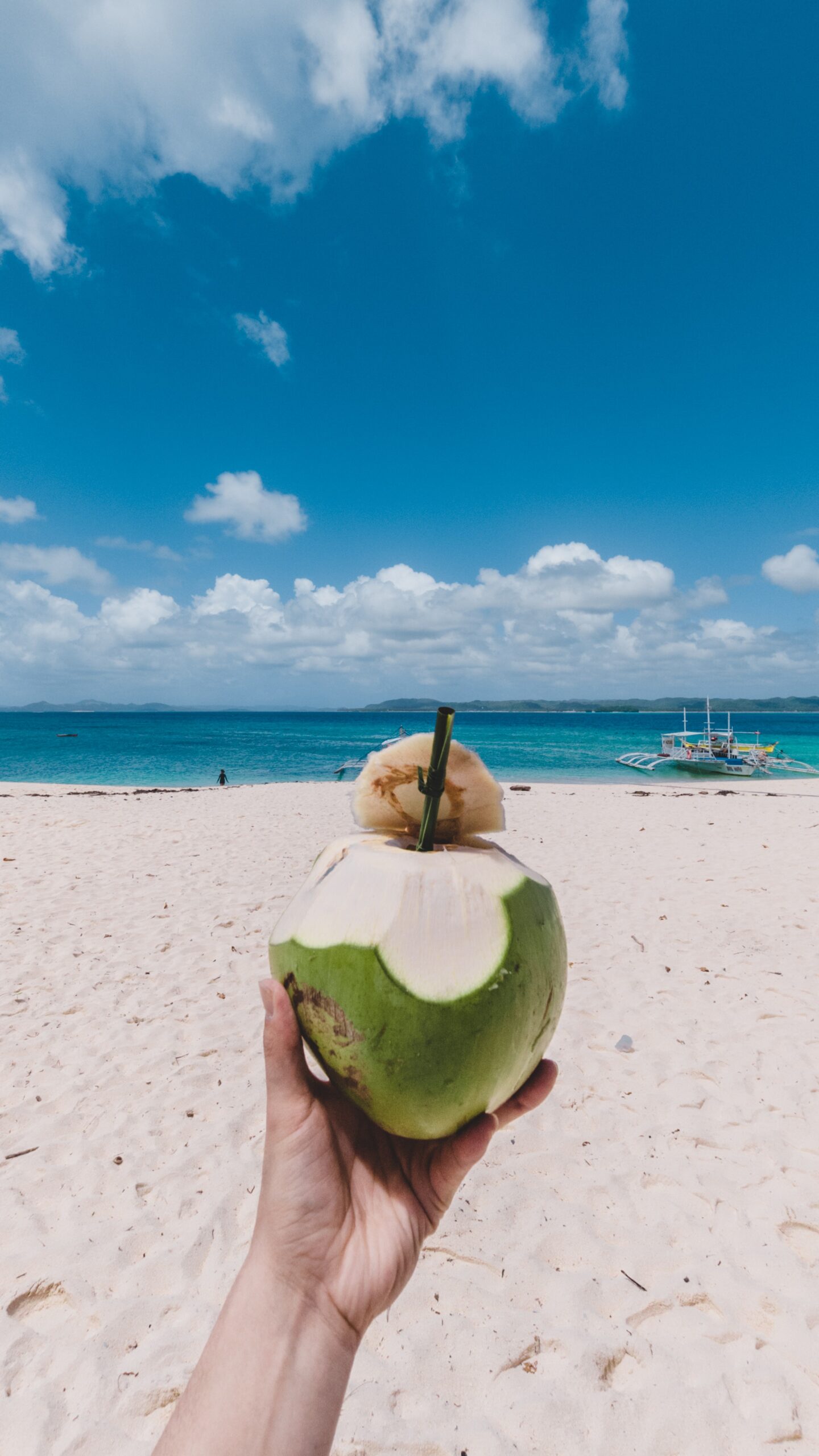Best Coconut water Review: Discover the best one
This time we are going to talk about coconut water, an exquisite drink obtained from the green coconut and which, thanks to its numerous properties, provides great benefits for our body. We will inform you about the different ways of using and marketing this exotic drink.
At the end of this article, you will be aware of the main characteristics of coconut water, its different varieties, combinations, sizes, brands and prices, among other fundamental aspects that will allow you to make the best purchase choice.
What is important
[su_list icon=”icon: check-circle” icon_color=”#3de112″ indent=”25″]
- Coconut water is found in young green coconuts, from which it is drunk directly. It is also sold industrially in packaged bottles made of cardboard or glass, which are sold in health food stores and grocery stores.
- Because of its flavor and its many nutritional properties, coconut offers a variety of uses. Besides water, coconut milk and coconut oils are also used for cooking, skin care, hair care and other purposes.
- It is important that before buying industrialized coconut water, you know its particularities and differences with natural coconut water, as well as its components, packaging and uses, among other important aspects.
[/su_list]
Coconut water: our recommendation for the best products
- NATURAL HYDRATION
- REFRESH YOURSELF
- FAT-FREE, GLUTEN-FREE, and NON-GMO
- ONE 6-PACK CASE of 33.8 OUNCE BOTTLES
- SMOOTH, REFRESHING COCONUT TASTE
- REPLENISH LOST ELECTROLYTES
- GLUTEN-FREE, and NON-GMO SMOOTHIE BOOST
- HYDRATE WITH THE GOODNESS OF COCONUTS
- #1 SELLING COCONUT WATER IN THE WORLD
- Now with colors from natural sources
- Always bursting with real fruit flavor
- GLUTEN-FREE, and NON-GMO SMOOTHIE BOOST
- Zero sugar
- Each bottle has antioxidants and vitamins
- COCONUT AND FRUIT FLAVORED WATER DRINKS
- HEALTHY FLAVOR AND JUST 10 CALORIES -
- ANTIOXIDANT INFUSED –
- FREE OF ARTIFICIAL SWEETENERS
- CAFFEINE – Contains 35 milligrams of caffeine per serving.
- ZICO is pure 100% coconut water and 100% hydrating
- Replenish everyday moments, naturally. With 5 naturally occurring electrolytes
- NO added sugar
- ZICO is also gluten-free, fat-free, and Non-GMO with only 45 calories.
Shopping Guide: What You Need to Know About Coconut Water
The main purpose of this shopping guide is to provide you with all the necessary information about coconut water, including its main benefits and less favorable characteristics, so that you can analyze in depth what this product is before purchasing it.

What is coconut water and what are its benefits?
Coconut water is found inside young green coconuts, from which it can be drunk directly. Ripe brown coconuts have a thick layer of pulp and little coconut water, so it is advisable to pick the fruits when they are green to enjoy this delicious water.
As green coconuts are only found in tropical areas, this fruit is also industrially commercialized in several countries as a natural, refreshing and purifying drink, either in the form of cardboard boxes (mainly) or in glass bottles.
Among its many benefits, coconut water helps with weight loss, facilitates digestion, detoxifies the body, fights constipation, prevents infections, regulates blood pressure, reduces the risk of cancer and improves kidney function.
Coconut water, coconut milk or coconut oil – what should you pay attention to?
Coconut is a fruit that has multiple properties and forms of use. Below we describe the characteristics of coconut water, coconut milk and coconut oil, so that you can know their main differences and peculiarities.
Coconut water . Coconut water is a drink extracted directly from younger coconuts and has great health benefits as it contains numerous vitamins and minerals, including potassium and magnesium. Coconut water is usually consumed directly from the fruit or through industrially packaged products, usually sold in 330 ML, 500 ML or 1 LT cardboard or glass bottles.
Coconut milk . Coconut water is often confused with coconut milk, but the main difference between the two is that coconut milk is made by grinding the pulp of the ripe coconut. It is also creamier and whiter than coconut water. Many vegans consume coconut milk as a substitute for cow’s milk, but it is also used to make desserts and beauty products as it has numerous properties, and its thick texture makes it very versatile and manageable.
Coconut oil . Coconut oil, also known as coconut butter, is a fatty substance extracted, like coconut milk, from ripe coconut pulp. Despite its high percentage of lipids, it is recommended as a staple of a healthy diet. Due to its many benefits, coconut oil is used for food preparation as well as for skin and hair health. It is also antibacterial, antioxidant, tissue regenerator and healing, among many other things.
| Coconut Water | Coconut milk | Coconut oil | |
| main uses | Drinks | drinks, food | food, cosmetics |
| Texture | Liquid | creamy, thickened | Oily |
| Energetic value | 19 calories x 100 grams | 230 calories x 100 grams | 862 calories x 100 gram |
Purchasing Criteria
Below we will discuss the most important aspects to consider when buying coconut water, so that you can differentiate the different products and their particularities, as well as their nutrients and utilities.
[su_list icon=”icon: arrow-right” icon_color=”#3ee112″ indent=”25″]
- Natural or industrial coconut water
- Types of packaging
- Uses
- Components
[/su_list]
Natural or industrial coconut water
As we mentioned throughout the article, coconut water can be drunk directly from the fruit, or it can be consumed in cardboard or glass containers sold in supermarkets, health food stores and health food stores.
Natural Coconut Water: Ideally, you should drink the water directly from the coconut to take full advantage of its properties. This is much healthier and cheaper. But the truth is that there are places where coconut trees do not grow and therefore the fruit is more difficult to obtain, or it is imported at high prices and with additional preservatives.
Industrial coconut water: In general, in the industrialization process there is usually no great nutritional loss, as the minerals are preserved and the only vitamin that can be lost is C, which is the most sensitive. But it is also true that packaged coconut water contains preservatives and additives.
If you are buying industrial coconut water, it is advisable to look for well-known brands and check the labels carefully. On the market you can find organic coconut water, which although more expensive, has less chemical additives and above all less glucose, as industrialized coconut water usually has a lot of added sugar.
Types of packaging
We also mentioned that coconut water is sold in the market as health drinks, packaged in glass or cardboard bottles (these are the most common containers for coconut water). It is also sold in cans, although this is very rare.
The ideal is to look for glass containers, as it is the most hygienic material available, does not contaminate or interfere with the natural flavor of coconut water, it is versatile, reusable and, therefore, more beneficial to the environment.
Glass containers are more expensive per se, especially for coconut water, as the organic variant, which is much more expensive, is usually packaged in this material, but it’s worth paying a little more and enjoying all its benefits.
Uses
Although coconut water is mainly used as a natural (and somewhat exotic) drink, due to its numerous nutrients, its properties are also used for cooking, aesthetics and health. Here are some of its other uses for you to consider:
Skin care . Due to its moisturizing and skin regenerative properties, coconut water is also used as the main ingredient in anti-aging facial masks. In fact, the cosmetic industry has already incorporated it into creams and lotions, especially for acne.
Hangover . Although it may seem strange, there is a nutritional reason behind this fact: when you drink too much alcohol, your potassium levels drop, causing discomfort and, above all, a headache, and if there is one thing coconut water has in plenty is potassium, so it will help replenish this mineral in your body.
Aromatization . Due to its liquid state, coconut water is the least used form of coconut in cooking. However, due to its tasty taste, many people use it to replace the water used to boil food and take advantage of its particular flavor and aroma to give a different touch to sweet and savory dishes.

Components
By now it is more than clear to you the many benefits of coconut water. They are due to their many components, including vitamins C and B, and minerals such as potassium, magnesium, iron, calcium, phosphorus, copper, sulfates and chlorides. Of all these components, potassium stands out, as it comprises more than 50% of the concentration of coconut water. In addition, this drink contains certain amino acids that exceed the percentages found in cow’s milk. It’s a great way to cool down.










